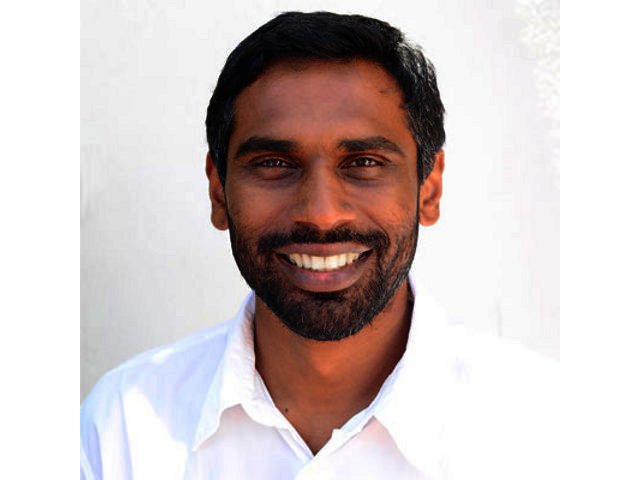The 2016 Edinburgh Medal will be jointly awarded to Kevin Govender from the Cape Town-based Office of Astronomy for Development and the International Astronomical Union (IAU) on Wednesday 30 March at the 2016 Edinburgh International Science Festival, to recognise their wide reaching contributions to science. It is the first time in its history that this award goes to a South African.
It is awarded jointly for the creation and practical establishment of the IAU Office of Astronomy for Development, which integrates the pursuit of scientific knowledge with social development for and with those most in need. The office, launched in 2011 by the Minister of Science and Technology, the Honourable Mrs Naledi Pandor, is hosted at the South African Astronomical Observatory in Cape Town, South Africa, in partnership with the National Research Foundation and the South African Department of Science and Technology. Under the pioneering stewardship of its first Director, Kevin Govender, the Office of Astronomy for Development (OAD) has successfully harnessed astronomy in the service of global education and capacity building. The OAD was established as part of the IAU’s decadal strategic plan “Astronomy for Development,” which was initiated and driven within the IAU by the renowned astronomer Prof George Miley.
The Edinburgh Medal is a prestigious award given each year to men and women of science and technology whose professional achievements are judged to have made a significant contribution to the understanding and well-being of humanity.
Kevin Govender and President of the IAU, Silvia Torres Peimbert, will be presented with the Edinburgh Medal at the Chambers of the City of Edinburgh Council on Wednesday, 30 March, 2016. They will give the Edinburgh Medal Address: Astronomy for a Better World as part of the 2016 Edinburgh International Science Festival, in the presence of Lord (Martin) Rees, the Astronomer Royal. The 2016 Edinburgh International Science Festival will run from 26 March to 10 April.
Lord Provost of City of Edinburgh Council, the Right Honourable Donald Wilson commented; “The difference that Kevin Govender and the IAU have made in developing countries is astronomical. Govender has been leading the Office of Astronomy for Development since 2011 and has overseen the expansions from its roots in Cape Town, South Africa to be extended to a further nine regional offices in Armenia, China, Colombia, Ethiopia, Jordan, Nigeria, Portugal, Thailand and Zambia.
The IAU strategy to use astronomy to stimulate global development is inspiring, it demonstrates how science, technology and culture impacts on our everyday lives and how we can use science to improve communities. I’m thankful to Kevin and IAU for creating opportunities that might lead us to healthier and wealthier futures.”
Within its 28 years, this is only the second time that The Edinburgh Medal has been jointly awarded to an individual and an organisation; in 2013 Professor Peter Higgs and CERN received the medal. Previous individual recipients of The Edinburgh Medal include Prof Jane Goodall (1991), Sir David Attenborough (1998) and Prof Jocelyn Bell Burnell (1999). The list of previous recipients also include four Nobel laureates: Prof Abdus Salam (1989), Prof Wangari Maathai (1993), Sir John Edward Sulston (2001) and Prof Peter Higgs (2013).
Director of Edinburgh International Science Festival, Dr Simon Gage said; “The Edinburgh Medal is awarded to an individual or an organisation who have not only discovered great science but have contributed more broadly to society. It’s an unusual award that recognises two dimensions of the work – the scientific and the social consequences. I’ve followed the work of Govender and the IAU for many years, the positive impact in the schools, universities and communities where they operate is incredible and helping to build a better world”
2016 Edinburgh Medal co-recipient Kevin Govender commented; “Besides its technological, scientific and cultural contributions, astronomy fundamentally gives us the perspective we need to change the world, and it is amazing to see how this vision has rallied people and organisations from just about every continent. It has been, and continues to be, a journey driven by many with a shared passion for both science and society."
On behalf of the IAU, its President Prof Silvia Torres Peimbert said; “I am delighted that the work of the IAU in the field of development has been recognised by the award of this medal. Astronomy is an exciting and stimulating pursuit and has a large part to play in inspiring the next generation of scientists from developing countries. I hope this award will highlight this important work and encourage others to contribute.”
Winners of Edinburgh Medal to date:
1989 Professor Abdus Salam
1990 Professor Stephen J Gould
1991 Professor Jane Goodall
1992 Professor Heinz Wolff
1993 Professor Wangari Maathai
1994 Professor Manuel Pattarroyo
1995 Sir John Crofton
1996 Professor Richard Levins
1997 Professor Amartya Sen
1998 Sir David Attenborough
1999 Professor Jocelyn Bell Burnell
2000 Professor Lynn Margulis
2001 Sir John Sulston
2002 Lise Kingo
2003 Professor Wang Sung
2004 Professor Steven Rose
2005 Professor Colin Blakemore
2006 Professor James Lovelock
2007 Dr Richard Horton
2008 Professor Chris Rapley CBE
2009 Professor John Beckwith
2010 Professor Sir Alec Jeffreys
2011 Professor Carl Djerassi
2012 Dr James Hansen
2013 Professor Peter Higgs/CERN
2014 Professor Mary Abukutsa-Onyango
2015 Mary Midgley





